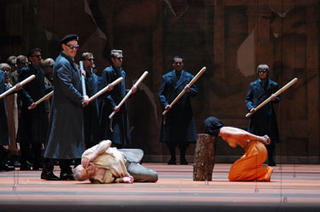Philip Glass, Waiting for the Barbarians
J. M. Coetzee, Waiting for the Barbarians |
Perhaps flying under the radar a bit because of the überhype surrounding Dr. Atomic, Philip Glass has just premiered a new opera, too. Performances of Waiting for the Barbarians, based on Nobel laureate J. M. Coetzee's book of the same name, began at the Theater Erfurt in Erfurt, Germany, on September 10 and continue through October 26. Shirley Apthorp published a preview article (Philip Glass Talks About 'Barbarians' Premiere, War, Music, September 9) with Bloomberg News:
Unlike so many modern composers, who slowly write works that quickly disappear after a first hearing, Glass, 68, is prolific and popular. This is his 21st opera, adapted for the stage by Christopher Hampton ("Sunset Boulevard," "Dangerous Liaisons") who worked closely with South African novelist John M. Coetzee. Set in a fictitious frontier town, whose magistrate is driven by his conscience to a quixotic act of rebellion, the story takes place after a nameless state has waged an imperialistic war based on lies. "Barbarians" is a political allegory, a love story, a tragedy and a wake-up call.You should, as they say, read the whole thing. Catherine Hickey then reviewed the opera (Philip Glass's New Opera Evokes Abu Ghraib in Tale of Torture, September 13) for Bloomberg News:
Apthorp: What made you decide to write this opera?
Glass: I read John Coetzee's book some time ago. And I was amazingly interested in the story. It's about social change and society, about violence and non-violence. The book is very much like Orwell's 1984. It was a fantasy. But since it was written, we have lived to see it become reality.
This reviewer found that "the scenes of violence are unconvincing." The capsule piece on the premiere (Philip Glass opera gets ovation, September 12) from BBC News reports that Glass received a 15-minute ovation at the premiere:Colonel Joll arrives from the capital intent on finding prisoners to give him information on the "barbarians," who, he says, are planning to attack the Empire. He describes his methods of extracting confessions to the unlikely hero of the piece -- the world-weary, womanizing Magistrate (sensitively played by Richard Salter) -- with the argument that "pain is truth." Joll and his henchmen use the fabricated outside threat --the barbarians never arrive -- to inflict their own brand of terror on the people. "Normally speaking we would never approve of torture, but I think it's generally understood that this is an emergency," says Joll. (Unfortunately, Eugene Perry's voice is much too weak to make him sufficiently intimidating in the role.)
Staged by Guy Montavon with Dennis Russell Davies as musical director, the production borrows heavily from the media photos of Abu Ghraib that shocked the world: prisoners are hooded, leashed and stripped to the waist. It's an effective device: The images revive the sense of revulsion provoked by Abu Ghraib, at the same time bringing the opera right into the present day. Glass's score works almost like a movie soundtrack: It creates atmosphere and helps tell the story without commanding center stage. The use of a choir in the orchestra pit -- voices off-stage singing wordless vowels -- adds to the filmic feel.
The "Barbarians" of the title are nomadic people deemed by the "civilised" whites to be socially and racially inferior. Glass previously said he saw the opera as a critique of President Bush's administration and its war against Iraq. However, its sets and costumes remain timeless, underlining the universality of Glass' themes. Its music contains all the characteristics of the "minimalist" style that made him famous.There are plans to take this production to Amsterdam and then to Austin, Texas. The Theater Erfurt has put a beautiful set of production photos online.






















































No comments:
Post a Comment